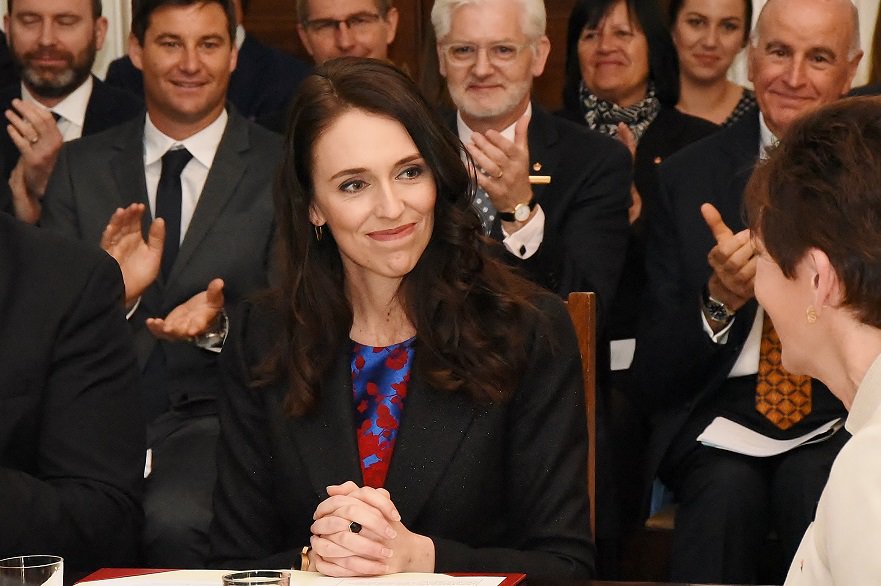
A primeira-ministra da Nova Zelândia, Jacinda Ardern, anunciou que o coronavírus foi “atualmente” eliminado no país.
Houve apenas cinco novos casos de Covid-19 relatados na segunda-feira, sem uma ampla transição da comunidade.
Ardern disse que o país até agora conseguiu evitar os piores cenários de um surto e continuaria a caçar os últimos casos.
Facilitando o bloqueio
Assim, a partir da meia-noite de segunda-feira, certas empresas, como a construção, poderão reabrir, mas as regras de distanciamento social ainda serão aplicadas.
“Estamos abrindo a economia, mas não estamos abrindo a vida social das pessoas”, disse Ardern no briefing diário do governo.
A diretora-geral de Saúde, Ashley Bloomfield, disse que o baixo número de novos casos nos últimos dias “nos dá confiança de que alcançamos nosso objetivo de eliminação”.
Ele alertou que “eliminação” não significava que não haveria novos casos “, mas significa que sabemos de onde vêm nossos casos”.
Ardern disse que “não houve transmissão comunitária não detectada na Nova Zelândia”, acrescentando: “Vencemos essa batalha”.
Coreia do Sul
Enquanto isso, a Coréia do Sul está olhando para reabrir escolas à medida que o número de casos começa a diminuir.
As autoridades notificaram 10 novos casos na segunda-feira, o 26º dia consecutivo em que esse número chegou a dois dígitos.
Usando um programa ativo de teste e quarentena, a Coréia do Sul até agora conseguiu retardar seu surto sem impor bloqueios ou proibições de negócios.
No entanto, as escolas foram fechadas e os programas de aprendizado remoto foram instalados em seu lugar.
O primeiro-ministro Chung Sye-kyun instruiu as autoridades educacionais a preparar medidas para garantir a higiene e reforçar a distância entre os alunos nas escolas, para que o governo pudesse anunciar um cronograma para a reabertura das escolas até o início de maio.
As autoridades da China registraram três novos casos na segunda-feira e passaram 12 dias sem registrar uma morte relacionada ao Covid-19.
O surto de coronavírus se originou no país e 723 pessoas permanecem no hospital sofrendo com o vírus, enquanto outras 1.000 estão sendo mantidas em isolamento.
Pequim acrescentou mais uma morte post mortem à sua contagem, elevando o número total de mortos na China para 4.633 casos, de 82.830 casos.
Dos novos casos, dois foram importados e um foi detectado na província de Heilongjiang, na fronteira com a Rússia, segundo a Comissão Nacional de Saúde.
Você pode fazer o Jornal GGN ser cada vez melhor.
Apoie e faça parte desta caminhada para que ele se torne um veículo cada vez mais respeitado e forte.



 produtos
produtos




—-A team of scientists at the University of Oxford are working to produce a vaccine to combat Covid-19. Adar Poonawala’s Serum Institute has partnered with the Oxford vaccine project as one of the seven global institutions behind manufacturing the vaccine.—-
—–‘In around two weeks, we can produce five million doses a month and scale that up to 10 million after six months,’ he said.—
This is not a time to make money, says Indian partner of Oxford vaccine attempt(https://www.indiatoday.in/business/story/this-is-not-a-time-to-make-money-says-indian-partner-of-oxford-vaccine-attempt-1669918-2020-04-220
A team of scientists at the University of Oxford are working to produce a vaccine to combat Covid-19. Adar Poonawala’s Serum Institute has partnered with the Oxford vaccine project as one of the 7 global institutions behind manufacturing the vaccine.
India Today Web Desk—New Delhi–April 22, 2020—-UPDATED: April 23, 2020 05:00 IST
Adar Poonawalla, chief executive officer of Serum Institute of India — which is helping produce a vaccine for Covid-19 developed by Oxford, said this is not the time to make money from a vaccine against the novel coronavirus, which has caused a global pandemic. Speaking to India Today TV Adar Poonawalla said that the need of the hour is to make a Covid-19 vaccine accessible to as many as possible. We won’t be patenting any vaccine we produce nor will we take royalties, he also said.
A team of scientists at the University of Oxford are working to produce a vaccine to combat Covid-19. Adar Poonawala’s Serum Institute has partnered with the Oxford vaccine project as one of the seven global institutions behind manufacturing the vaccine.
Adar Poonawala was also joined by Oxford professor Dr Adrian Hill, who is leading the team developing the vaccine, in the interview. Dr Adrian Hill said the Oxford University is starting its clinical trials for the Covid-19 vaccine from Thursday.
The vaccinologist said several vaccines are in the clinical trials stage at the moment. ‘We are starting tomorrow… Have to test its safety, to see whether it produces immune response and what protection the vaccine offers,’ Dr Hill said, while speaking about the challenges ahead for his team.
When asked how confident is he about the vaccine, Dr Hill said there are several indicators the vaccine being developed by Oxford could be a good one.
He elaborated, ‘One is that this is a single dose vaccine. It is much more suitable for a pandemic situation. The technology of this vaccine has been used before so we are hopeful this will be safe as well. The scale up process to produce large numbers is achievable. Our Indian partner, Serum Institute, will help us achieve this.’
On being asked what could go wrong in the vaccine, Dr Hill answered saying there are several risks with any vaccine and it might not be safe, which is unlikely.
‘There might just not be enough people to test on to check the vaccine’s efficacy. We need to be lucky in the clinical trials we choose that we get enough people without Covid-19 in the control group to show conclusively that the vaccine is working well,’ he explained.
Meanwhile, Adar Poonawala said his institute’s team members are working closely with Dr Hill for the vaccine.
‘In around two weeks, we can produce five million doses a month and scale that up to 10 million after six months,’ he said.
Adar Poonawala was also asked how confident is he that the Covid-19 vaccine being developed could be winner compared to ones that the others are making, and he said he cannot speak for others but all he can say is that the scientists at Oxford are among the best in the world. I have a lot of faith If anyone succeeds, I’m sure Dr Hill and his colleagues will be the ones to succeed, Poonawala said.
But by when can people expect the vaccine? Dr Hill said, ‘Well we are aiming hundreds of millions of doses with our partners by Q4 this year. But a word of caution, a lot of things have to go right for that on the clinical trials and scale up process.’
https://www.indiatoday.in/business/story/this-is-not-a-time-to-make-money-says-indian-partner-of-oxford-vaccine-attempt-1669918-2020-04-22
https://www.seruminstitute.com/news.php
INTRODUCTION(https://www.seruminstitute.com/about_us.php)
Serum Institute of India Pvt. Ltd. is now the world’s largest vaccine manufacturer by number of doses produced and sold globally (more than 1.5 billion doses) which includes Polio vaccine as well as Diphtheria, Tetanus, Pertussis, Hib, BCG, r-Hepatitis B, Measles, Mumps and Rubella vaccines. It is estimated that about 65% of the children in the world receive at least one vaccine manufactured by Serum Institute. Vaccines manufactured by the Serum Institute are accredited by the World Health Organization, Geneva and are being used in around 170 countries across the globe in their national immunization programs, saving millions of lives throughout the world.
Serum Institute of India is ranked as India’s No. 1 biotechnology company, manufacturing highly specialized life saving biologicals like vaccines using cutting edge genetic and cell based technologies, antisera and other medical specialties.
Serum Institute of India was founded in 1966 by Dr. Cyrus Poonawalla with the aim of manufacturing life-saving immuno-biologicals, which were in shortage in the country and imported at high prices. Thereafter, several life-saving biologicals were manufactured at prices affordable to the common man and in abundance, with the result that the country was made self-sufficient for Tetanus Anti-toxin and Anti-snake Venom serum, followed by DTP (Diphtheria, Tetanus and Pertussis) group of Vaccines and then later on MMR (Measles, Mumps and Rubella) group of vaccines.
The Philanthropic philosophy of the company still not only exists but has been proliferated to bring down the prices of newer vaccines such as Hepatitis-B vaccine, Combination vaccine etc., so that not only Indian’s, but the entire under-privileged children of the world are protected from birth onwards.